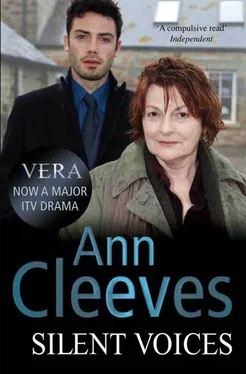‘Billy Wainwright taken a look?’
‘For all the good it’ll do, he says.’ The woman smiled fondly and Vera wondered what it was with the man. He wasn’t even much of a looker. He was sympathetic, she supposed. A good listener. Perhaps that was the attraction.
‘I’ve been in the changing room already,’ Vera said. ‘So there’s no real problem with contamination if you let me in.’
The policewoman shrugged. Vera was the boss and, besides, it wasn’t her problem.
Inside the changing room the television high on the wall was still on. Sky News with pictures of the US president and his First Lady visiting somewhere exotic. African children in starched white shirts and women wrapped in brightly coloured batik cloth. The dead woman’s locker was close to the one Vera had used that day. She pulled on a fresh pair of gloves. The lock was stiff and for a moment she wondered if she’d get it open, then she put her shoulder to the door, pushing it until the mechanism caught. The door swung towards her.
Vera looked inside, without touching anything at first. The clothes were neatly folded. A floral skirt, a white shirt, almost as crisp as those worn by the children in the newsreel, a navy cotton sweater. White lacy underwear, as fresh as if it had been newly bought. How did women do that? Vera’s turned grey after the first wash. And she would never have bought anything so glamorous. Under the clothes, a pair of sandals. You could tell they’d be comfortable, the leather soft, but stylish too, with a small heel, the leather plaited and fastened at the ankle. Not the sort of thing Vera would wear in a million years.
On the television the weather forecast was being read by a young woman in a breathy voice. The next few days would be unusually mild and sunny for the time of year. ‘Beautiful spring weather.’ Vera turned briefly and saw a photograph of fat lambs and catkins. The people who ran the smallholding next to her house were still lambing. It was always later in the hills this far north.
No handbag. That seemed odd to Vera. Wouldn’t every woman have a handbag with her? Even Vera carried her stuff in a canvas shopping bag. There was a purse, though, tucked inside one of the sleeves of the navy jersey. Had the woman left her bag in her car because it was too bulky for the locker? A bunch of keys was attached to one corner of the purse by a metal clip. Opening it, she found the woman’s health-club membership card. The photo was small and grainy, but was clearly of the victim. There was a name.
Jenny Lister. Aged forty-one. Vera would have guessed her as a couple of years younger than that. The address was a village in the Tyne valley, Barnard Bridge, which was about five miles away. Very nice, Vera thought, and pretty much what she would have expected. But why would anyone want to murder a middle-aged woman from an affluent community in rural Northumberland?
She flicked through the contents of the purse. A couple of credit and debit cards in the same name and twenty pounds in cash. One of the credit cards was labelled Mrs Jenny Lister. So there was a husband, or at least had been once. If the couple were still living together, he was probably at work. Vera looked at her watch. It had already gone three. Perhaps the couple had sat down for breakfast together, discussed their day. Now he would have no idea what had happened to his wife, no concerns for her safety. Unless, of course, he’d followed her and strangled her.
Upstairs in the lounge, Ashworth and his colleagues had almost worked their way through the members of the aqua-aerobics class. He was using a small office, calling people in one at a time to take their contact details, and to ask if they’d been into the steam room or noticed anything unusual. The plate on the office door read Ryan Taylor, deputy manager.
‘Who’s the manager?’ Vera asked, distracted for a moment. ‘The big cheese?’
‘Woman called Franklin. She’s away on leave. Morocco.’
‘Very nice.’ She said it automatically, but Vera knew really she’d hate foreign travel. She came out all blotchy in the heat.
Ashworth was on his own, catching up on the notes from his most recent interview.
‘We’ve got a name,’ Vera said. ‘Jenny Lister. Lives out at Barnard Bridge.’
‘Worth a bob or two then.’ Ashworth looked up from the sheet of paper.
‘I thought I’d head out there now. She might still have school-age kids. I’d rather tell them what’s happened immediately than have them phoning round her friends to find out where she is, causing lots of noise and fuss.’
‘Fine,’ Ashworth said. ‘Do you want anyone to go with you?’
‘I think I can find the way by myself.’ Vera knew it wasn’t her place to be ferreting round the dead woman’s home and family. She’d been told at appraisal after appraisal that her role was strategic. You should learn to delegate, Inspector. But she could do this better than anyone else in her team, so what point was there in delegating to an inferior investigator?
‘What do you want me to do when I’ve finished here?’
‘Talk to the staff,’ Vera said. ‘I was going to do it, but I’d rather get out to the family home. There’s that lass Lisa. She seems a little jumpy to me, could be there’s something on her mind. The woman on the desk is called Karen. She’s got a son, a student who’s working here as a temporary cleaner over his Easter holiday. Have a word with him. We need to check that he cleaned the steam room last night. There’s still a chance the body was here all night. Not likely, because you’d have thought someone would have reported the dead woman missing, but he needs talking to anyway. See if anyone remembers the victim. Taylor should be able to reproduce the photo from the membership card. They take them here when you join, so they’ll have them saved somewhere on the computer.’
‘You a member?’ Ashworth stifled a grin.
Vera ignored the question. ‘Show the photo to the staff, see if they know her. And get Holly to find out from her computer geek what time Jenny checked into the club this morning.’ She slid the car keys from the keyring that had been attached to Jenny’s purse. ‘And when you’ve chatted to the staff, see if her car’s still here. Best take a CSI with you. They’ll treat it as a crime scene. I think the victim’s bag might still be inside. If so, let me know.’
‘I’ll let the wife know I’ll be late then.’ The words were meant to be sarcastic, but Vera took no notice.
‘Aye. I’ll meet you back here if I finish in time. Otherwise I’ll give you a ring. Meeting first thing in the morning at the station. They’ve set up an incident room?’
‘Holly’s looking after that. Charlie’s been helping me take statements here.’
Vera nodded. She thought she’d better let Holly out to see some action the next day. She wasn’t a hard boss. Not really. She knew it was important to keep her troops happy. Walking across the car park, she realized she was starving. She’d picked up a cheese pasty from Gregg’s before going swimming and it was still in the bag on the passenger seat of the car. A bit greasy and tepid after sitting in the sun all day, but no meat in it, so nothing to go off. She ate it with relish and set off south and west towards the Tyne.
Barnard Bridge was west of the hotel, on the way to Cumbria. It was in an area unfamiliar to Vera. She’d grown up in the hills, and most of the crime in her patch occurred in the city or in the post-industrial villages on the south-east coast of the county. This was rich farming country. The cottages in the villages and small market towns had been bought up by professionals looking for the good life, environmentalists who seemed to square their green credentials with the commute along the A69 into Newcastle, Hexham or Carlisle. It was a place of farmers’ markets, independent booksellers and writers. A little bit of southern England planted in the north. Or so Vera thought. But she had a chip on her shoulder the size of Kielder Forest. What would she know? She’d never felt comfortable with the intellectual classes.
Читать дальше












